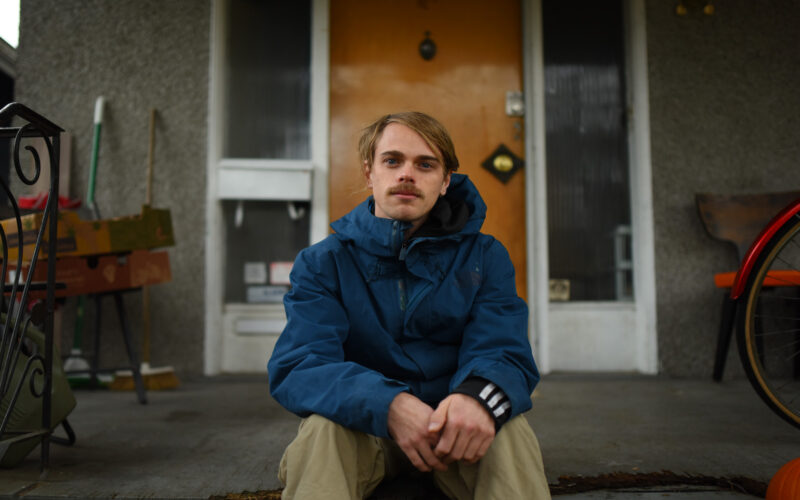“In order to survive, you have to be a dreamer.”
Suzanne Kilroy/Huculak
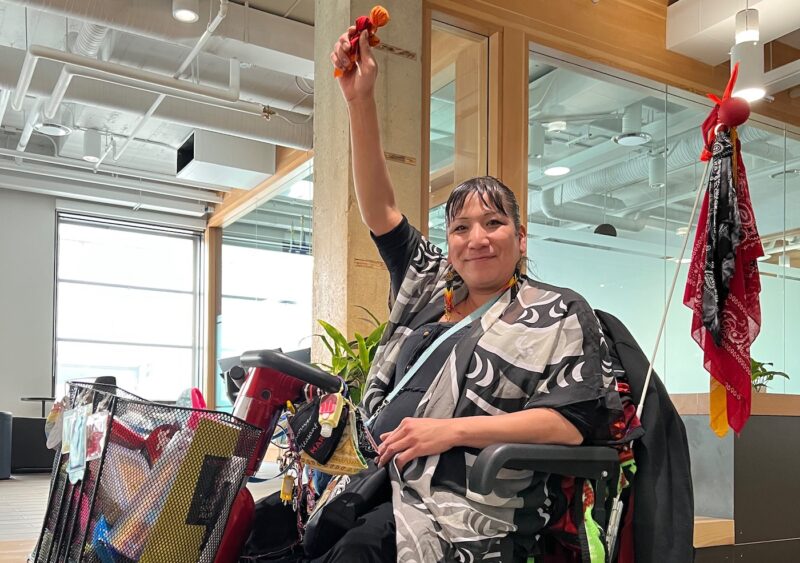
Suzanne is a medicine woman, palliative care worker and “Indian princess” in the Downtown Eastside. She grew up in the Thompson Okanagan First Nation, where she learned to gather food and fish salmon with her family. A residential and day school survivor, Suzanne left home when she was 17 to go to college. “You’re going to work in the air-conditioned office. We don’t want you to live like us,” one of her aunties told her.
“It was hard to be in school and be out by myself,” remembers Suzanne, who became a sex worker and drug dealer in Vancouver. “I got caught with 2 kilograms of heroin. I was 80 pounds. I lost my life down here for a little while, my vision. Then I went home and I found my way again.”
Finding her way again also meant being in residential school trauma therapy for a couple years.
“It all comes back to the land. What to eat, what to drink, where you’re from. I go home now for strength, to gather my wits.”
Still, life has not been easy for Suzanne. Since she had H1N1, Suzanne has struggled with her health.
“I have emphysema and asthma,” she says. “Three years ago I was in a coma from double pneumonia. I’m also recuperating from this. This is why I’m in a wheelchair.”
She says it’s her medicines and prayers that give her the strength to keep going. Suzanne now calls herself a “city girl.”
“All [nine of] my kids are raised here,” she says.
She lives in East Vancouver with her husband of 25 years, Robert. During the 2021 wildfire season in British Columbia, Suzanne was visiting her family in Merritt. She was in a caravan of cars that left when the city was placed on evacuation alert.
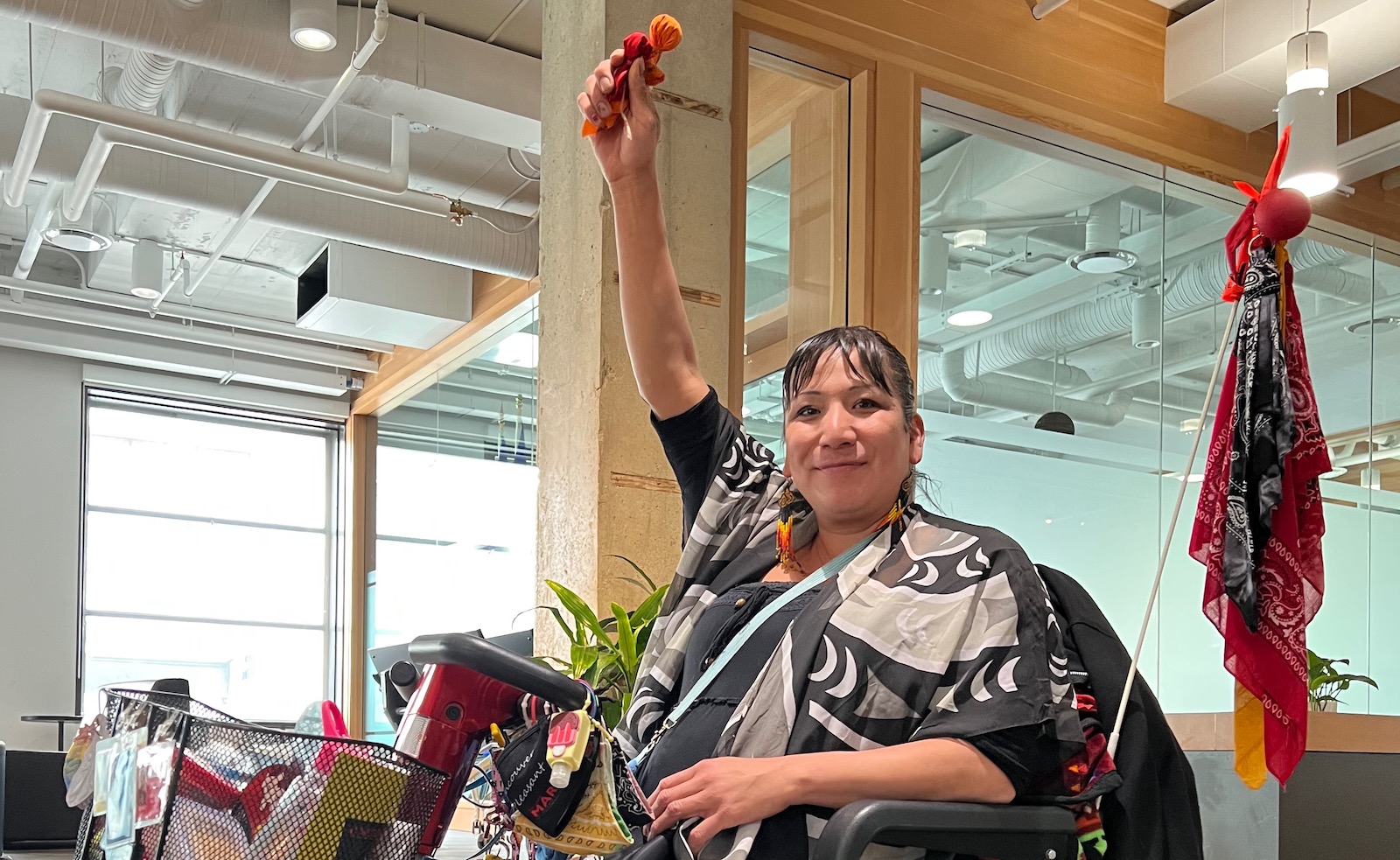
Suzanne Kilroy/Huculak is a medicine woman in Vancouver, Canada who was visiting family in Merritt, Canada during the 2021 Western North America heat wave. (CDP Photo/Sean Holman)
I was there last year off and on. My grandmas and my aunties, we all like to dry food. Growing up, anything we ate we killed it or grew it or picked it. I’m in a wheelchair, but I gather things. A lot of stuff I freeze or can. It’s like tradition, all the family gets together.
The fires were the worst ever. They were never that close. I’m watching it on the news. I’m seeing Lytton burned down. It wasn’t soon after that it was going closer to Merritt. It was going right over from Lillooet, over the mountains.
All 3 sides, fire’s just coming in. People’s houses, just going away. Lots of red sky. People with masks on and black hair, black skin from trying to fight fires, even just from the dust and the smoke in the air. Our skin was all black. You’re trying to conserve water because you don’t know if we’re going to need it right away, so you’re just washing your hands and face. Power’s going off and most Indians have 3, 4 freezers, one of deer, moose and salmon, and all that meat’s gone. Everybody’s hungry.
My family wouldn’t let me stay. I couldn’t breathe. I was coughing up blood and they got my friend from Vancouver to come and get me. Only the highway was open. There’s flames 100 feet high on one side and 50 feet high on the other side. We could feel the heat inside the car.
We’re at the bottom of the hill, watching the smoke way high like big volcano clouds or the Hiroshima bomb. That’s how high the clouds were and you could see the flames. In a matter of 20 minutes the whole mountain goes on fire and you’re just watching it. The trees just went like somebody poured gas on them.
There was a semi-truck and it had wood chips and it was on fire ahead of us. They were stopping the traffic so they could put the fire out. The fire’s only this far behind us. There’s women and kids getting out of the cars and running down the road. I told my family, “Stay in the car, whatever you do, stay in the car.”
At that point, I thought I was going to die. How do you survive? You don’t know where to go. You’re worrying about your entire family. Everything’s on fire around you. I prayed to Mother Nature: “If I’m going to die just take care of my family.” At least I’m already in my home valley if I was going to get burned to death. In Lytton, those 2 people died trying to save themselves. They burned. It keeps sticking to my mind. It’s the worst feeling. It’s my biggest fear of my life. Am I going to burn to death?
We drove through the flames. I was just crying watching my whole valley burn. All the berry picking. All gone. We grew up in those mountains. We saw a burnt deer on the side of the road. It died. He was walking. We saw him collapse and die. That’s the worst part. Seeing just devastation everywhere: broken hearts, broken minds and broken people.
I needed to go to the hospital right away. I have my inhalers and they’re not even doing anything at this point. My nose and my throat is full of soot and I’m trying to get it out. My throat’s bleeding. I needed oxygen and fluids. They said, if I was there any longer, my lungs would give out. I think if I stayed in the hospital, I would’ve died too. I would’ve given up. That’s how stressed I was in there. I miss my husband so much. I miss my kids. I just walked out. They let me stay home, but doctors brought me oxygen to my house.
It’s one of the things I’ve gone through thinking, “Why am I seeing this, God? Why am I going through this?”And now we all are. Some of the people that lost their homes are still homeless, in a hotel. Natives don’t have insurance. They get $100 a day from ESS [Emergency Support Services]. What will happen to them? All the stuff they work hard for all their life. It’s all gone in a day.
The government needs to do things. We’re the people that put those people in the seats. If I could have the power, I would buy 20 buildings and house some people. People are dying. Everybody’s tired. I’m so tired. I’m really tired. I don’t want our people to suffer anymore. So I don’t give up. I keep going every day. People got to have somebody strong.
You know how counsellors’ offices used to have this jar with affirmations? One day I was running around and I needed a message. I pulled out an affirmation and it said, “Maybe you’re the help this world needs.” I was so devastated. I was like, “Fuck, no! Why do I have to be strong? Where’s my help? Why did I see this stuff? Why did I have to deal with this?” My grandma said, “God put our things in places because we could handle it.” This hurts. It hurts to handle this. But I’m here. I guess I’m not done yet.
If Indigenous ever had a voice, it’s now. Speak up Indians, stand your power. This is your people, your land, your waters, your generations, your children, your grandchildren. It’s our home and our neighbours’ home. It’s about respecting our land now. We don’t [get] mad at it. We have to pray about it. It wants to change. Maybe that stuff needed to burn so other stuff can grow?
In order to survive, you have to be a dreamer. You have to dream. What brings me hope is prayers and our own medicines we pick from the land. What brings me hope is carrying the teachings on, hold up their drum, and just shout, “I’m not scared! I’m here and I’m not going to give up!” I’m Suzanne Kilroy and I’m an Indigenous woman, and I’m an Indian princess. I hold my medicines. What gives me hope is this medicine, my grandma’s prayers, that our children will be there, and that’s what’s going to carry our life on: medicines, prayer, people.
This testimony was originally published in Megaphone, on November 10, 2022.
Related Stories
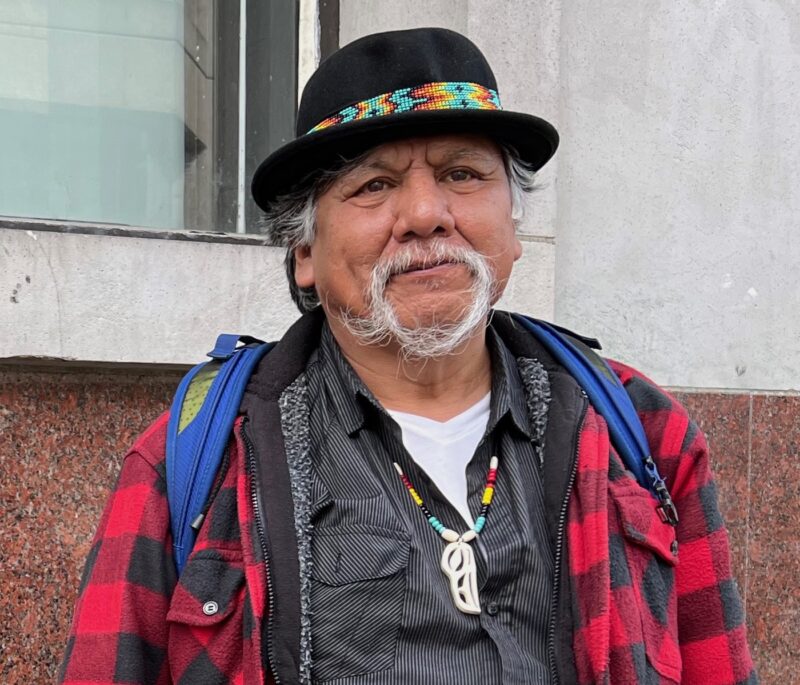
Peter Thompson, East Vancouver, Canada
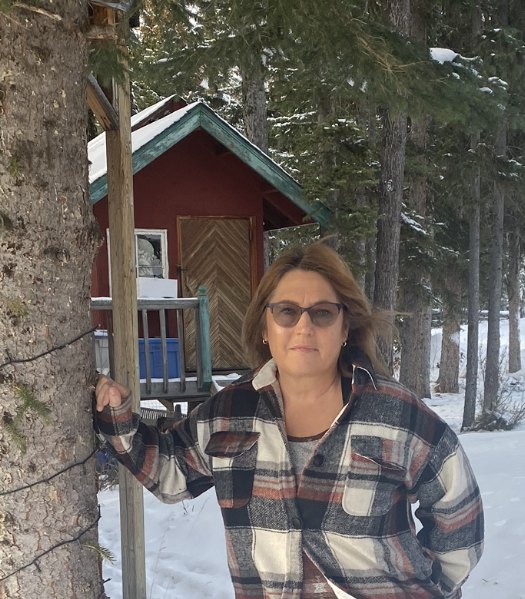
Cyndie Anderson, Mission, Canada
